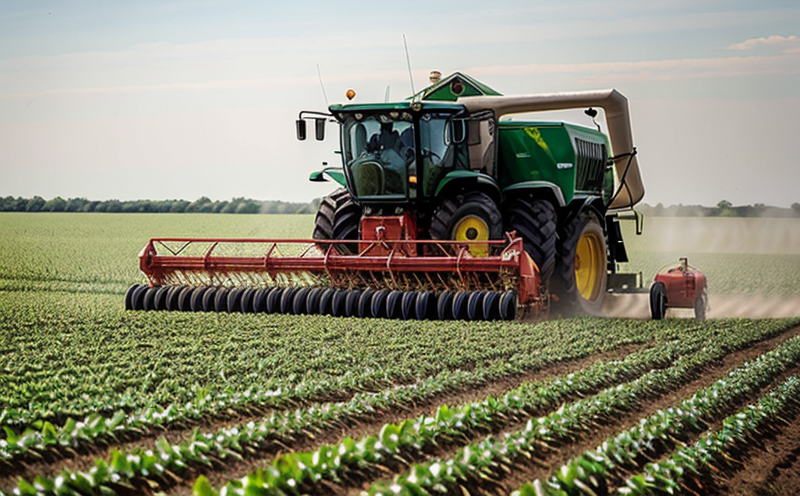Drone-Based Yield Monitoring Testing
Drones have revolutionized agriculture and forestry testing by providing an efficient, accurate, and cost-effective means of monitoring crop yield and productivity. This service leverages drone technology to perform detailed assessments that help in making informed decisions for agricultural management.
Drone-based yield monitoring involves the use of unmanned aerial vehicles equipped with high-resolution cameras and multispectral sensors to capture data over large areas. The primary objective is to gather precise information about crop health, growth stages, and overall productivity. This technology enables farmers and researchers to monitor their fields continuously, thereby optimizing resource usage and enhancing agricultural output.
The process typically begins with the selection of appropriate drone models that are suitable for capturing high-quality imagery. These drones can be equipped with visible light cameras or multispectral sensors depending on the specific requirements of the testing. The data collected includes detailed images of the field, which are then processed using specialized software to generate maps and reports.
The accuracy of these tests is crucial in ensuring reliable results. Therefore, strict quality control measures are employed during both the drone operation and data processing stages. This involves calibrating the drones regularly and validating the captured images against known standards. The use of advanced algorithms helps in interpreting the data accurately to predict future yields and identify potential issues early on.
In addition to providing real-time insights, this service also aids in long-term planning by offering historical data that can be used for trend analysis. This information is invaluable for optimizing irrigation schedules, adjusting fertilization programs, and implementing pest management strategies. By leveraging drone-based yield monitoring testing, clients gain a competitive edge through improved decision-making processes.
The implementation of this service ensures compliance with various international standards such as ISO 17925:2016 for agricultural drones and EN 384-1:2020 regarding the safety aspects. These standards ensure that the equipment used in drone-based yield monitoring is both reliable and safe, thus enhancing overall efficiency.
- Field Mapping: Creating detailed maps of fields to identify areas requiring special attention.
- Crop Health Assessment: Identifying stressed or diseased plants early for timely intervention.
- Irrigation Optimization: Ensuring optimal water usage based on real-time field conditions.
- Fertilization Management: Precise application of fertilizers to maximize crop yield.
Industry Applications
Drones play a pivotal role in various industries, including agriculture and forestry. In these sectors, drones are particularly useful for:
- Crop Monitoring: Regularly assessing crop health to ensure optimal growth.
- Pest Management: Identifying pest infestations early for effective control measures.
- Spraying Applications: Precisely applying pesticides and fertilizers over large areas.
- Harvest Planning: Predicting harvest times based on crop maturity levels.
Customer Impact and Satisfaction
The adoption of drone-based yield monitoring testing has significantly improved customer satisfaction in the agriculture sector. Farmers now have access to real-time data that allows for more informed decision-making, leading to better crop yields and reduced resource wastage.
One key aspect is the reduction in labor costs associated with manual field inspections. Drones can cover vast areas much faster than traditional methods, making it possible to monitor multiple fields simultaneously. This not only saves time but also ensures consistent quality checks across all areas of operation.
The accuracy and reliability of drone-based yield monitoring have been widely praised by customers who rely on these services for critical insights into their operations. The ability to detect subtle changes in plant health or soil conditions early can prevent significant losses due to diseases or poor growing conditions.
Moreover, the ease of use combined with advanced technology has made drone-based yield monitoring accessible even to smaller farms where resources might be limited. This democratization of sophisticated agricultural tools is expected to drive further innovation and adoption within this industry.
Use Cases and Application Examples
This service finds application in numerous scenarios, including:
- Initial Field Survey: Conducting an initial survey to establish baseline data for future comparisons.
- Pest Control Programs: Implementing targeted pest control measures based on drone-detected infestations.
- Spraying Operations: Executing precise spraying applications using drones equipped with spray systems.
Agriculture companies benefit from this service by enhancing their operational efficiency and sustainability. For instance, a leading agricultural company used drone-based yield monitoring to improve its wheat production process. By identifying weak spots in the field early through regular drone flights, they were able to apply targeted fertilizers only where needed. This resulted in increased grain quality while reducing unnecessary chemical usage.
Forestry management also benefits from this technology by using drones for forest health assessments and canopy mapping. These insights help foresters plan reforestation projects more effectively, ensuring that new plantings are done in areas most likely to thrive.





